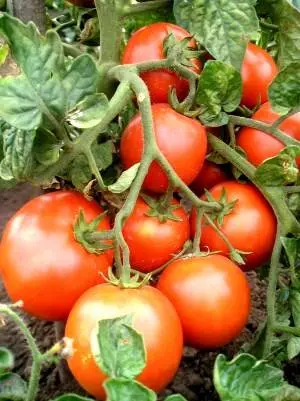Contents
When choosing varieties of tomatoes for open beds, it is necessary to pay attention not only to their early maturity, but also to cold resistance, bush height and taste. The concept of “taste” includes such a parameter as “sugar content”, applied to tomatoes in the same sense as to watermelons. The color, shape and size of tomatoes is determined by the preferences of tomato growers.
With rare exceptions, early ripening and ultra-early tomato varieties are determinant and very often standard.
Standard determinants require minimal care, do not require pinching, but they need a tie to a support, since with high yields and large tomatoes, plants can break under the weight of tomatoes that have poured juice.
In the southern regions, standard tomatoes are always planted in open ground, since of all the early varieties of tomatoes they have the highest cold resistance. In cold areas, they can be grown in greenhouses.
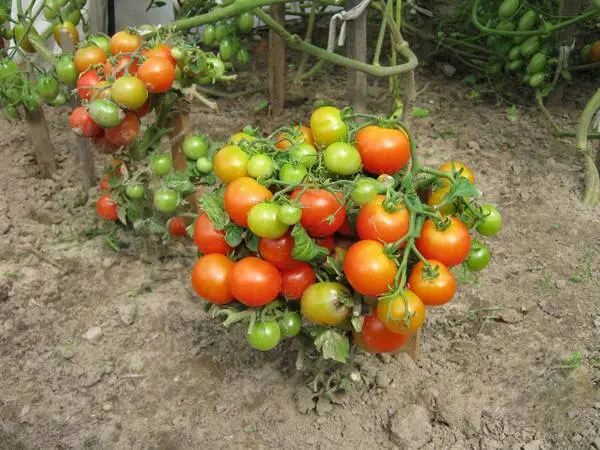
It should be borne in mind that the yield of tomato bushes in open ground is lower than in greenhouses.
Just like other tomatoes, early ripening varieties of tomatoes begin to be planted at the end of March for seedlings. But what to do if there is no room for many seedling containers on the windowsill in the apartment, and each type of vegetable requires its own germination regime. Far from always, a gardener can provide specific conditions for each vegetable.
With early ripe tomatoes, there is an option for seedless sowing, but only if there is a cold film greenhouse.
In such a greenhouse, beds are prepared in advance at the end of March and arcs are placed above them, which are covered with non-woven material. For some time, the ground under the arcs warms up. In the second half of April, tomato seeds are planted in the beds and each hole is covered with a plastic bottle with a cut off bottom.
Before germination, the seeds are protected from the cold by three layers of insulating materials. After germination, the bottles are removed, leaving the non-woven material on the arcs and the plastic film on the actual greenhouse. Depending on the ambient temperature, the temperature for seedlings can be adjusted by removing or throwing the material over the arches.
With the onset of warm days, if possible, the film can also be removed from the frame of the greenhouse itself, leaving the tomatoes to grow in the open.
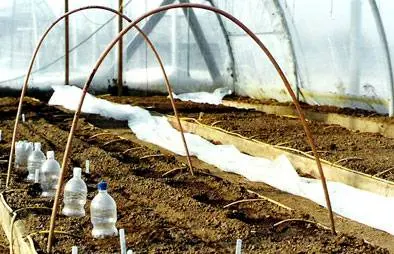
When choosing early-ripening varieties of tomatoes for open ground, you should definitely pay attention to the completely unique ultra-early variety, bred in Transnistria, “The Riddle”.
Ultra-early varieties of tomatoes
Tomato «Riddle»
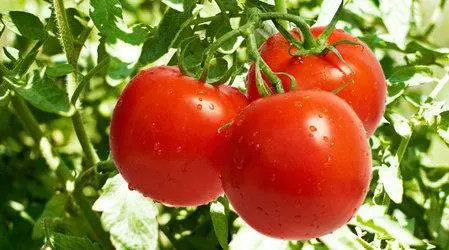
Determinate undersized variety with a powerful stem. The height of the bush is half a meter. According to gardeners, it ranks first among ultra-early varieties of tomatoes. No more than 90 days pass from the moment of sowing seeds to harvesting. With an average density of 7 bushes per meter, 20 kg of tomatoes can be obtained per unit area.
Tomatoes and bushes grow surprisingly even in size. If the growth of bushes is about 0,5 m, then the weight of tomatoes of this variety is up to 100 g.
The pulp of the fruit is dense, which allows you to bring the tomatoes home safe and sound, not only in a box, but also in a regular bag. Also, tomatoes of this variety have the best taste, being the champion among the early varieties of tomatoes in this parameter. Usually, early varieties of tomatoes cannot boast of a wonderful taste, being more suitable for conservation and culinary processing, which sharpen the taste of tomatoes.
Tomato bushes “Riddles” with a large number of leaves do not need to be tied up, having very strong branches. But the variety has a drawback: a very large number of stepchildren that need to be removed in time so that they do not take food from the ovaries. If the stepchildren are not removed, the tomatoes will turn out small.
But you can increase the number of bushes of this variety by rooting remote stepchildren. At the “Riddle” stepchildren take root very easily. In this case, it will be possible to get a harvest from the stepchildren a week and a half later than the mother bush, thus extending the fruiting period of the variety.
Tomato “Snegirek”
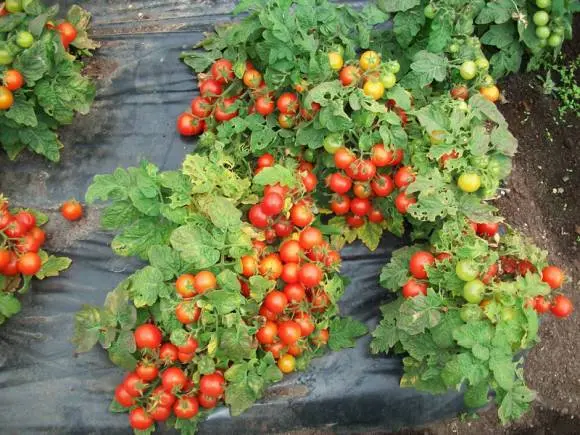
Not only an ultra-early, but also an ultra-determinant variety for open ground, capable of growing not only in the garden, but also on the balcony.
The height of the bush is not more than 0,4 m. The plant is standard, does not need a garter, does not require pinching. Vegetation 95 days. Of the benefits – a friendly return of the harvest.
With a small size of the bush, the fruits are quite decent in size and weigh an average of 150 g. The purpose of the variety is universal.
Tomato “Katyusha”
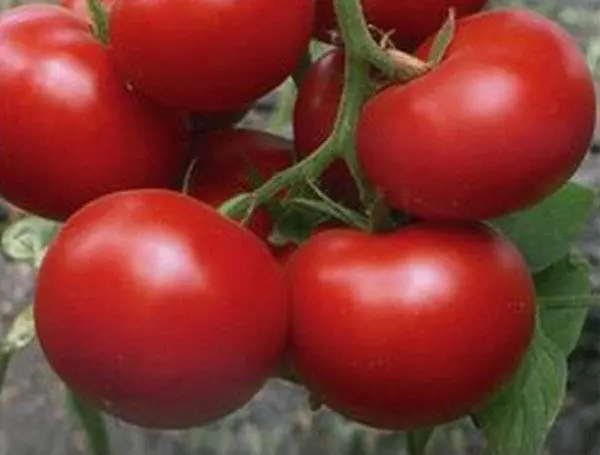
A relatively new variety, bred in 2001 and found its fans. Grows well in open beds. The variety is ultra-early, requiring 85 days before harvesting the first tomatoes.
Among its determinant comrades, it is a rather tall variety, growing up to 90 cm. 5 kg of tomatoes are obtained from one plant. Bushes of this variety per square meter should not be more than 5.
The pulp of tomatoes has good taste. The shape is spherical, slightly flattened. The usual weight is about 125 g. Tomatoes of the first stage can grow up to 150 g. Ripe fruits are pink. The variety is universal. Often used for canning and barrel salting.
The advantages of the variety are: good taste, high keeping quality, resistance to sudden changes in temperature, immunity to many diseases, drought resistance.
The disadvantages are the high demands on agricultural technology. With illiterate care, it loses its taste. It requires a mandatory garter, because due to the relatively large height of the bush and the large number of rather large tomatoes, the branches break off. In this regard, Katyusha loses to Riddle. Demanding for fertilizers.
Features of agricultural technology
In open ground, the variety is best grown in the southern regions. To the north, it grows well in greenhouses. The difference in growing conditions does not affect the yield.
With all the resistance to diseases, the variety is susceptible to phomosis and dry spotting.
Tomato “Bullfinch”
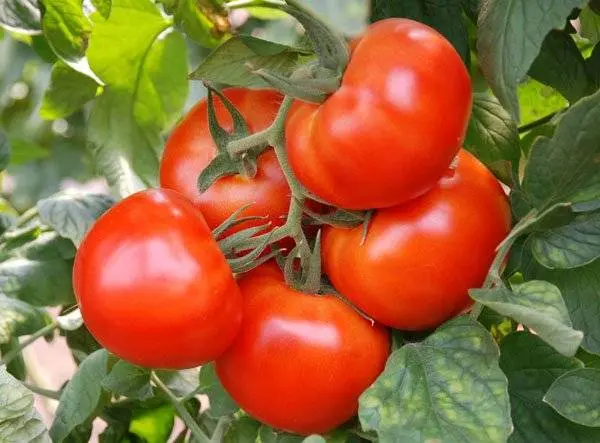
An ultra-early variety bred specifically for cold regions. Grown outdoors and in greenhouses. The bush is not standard, with limited growth. It grows no more than 40 cm. Thanks to its small growth, it can be grown on balconies. Does not require formation.
The ovaries are formed by brushes of 3-5 pieces. Weight of ripe tomatoes 140 g. Ripe dense red color. The pulp is juicy, dense, the taste is sweetish.
The advantages of the variety are drought resistance and cold resistance, high immunity to diseases, undemanding care.
Young tomatoes are planted on the beds by the beginning of June.
early ripe varieties of tomatoes
Tomato “White filling”
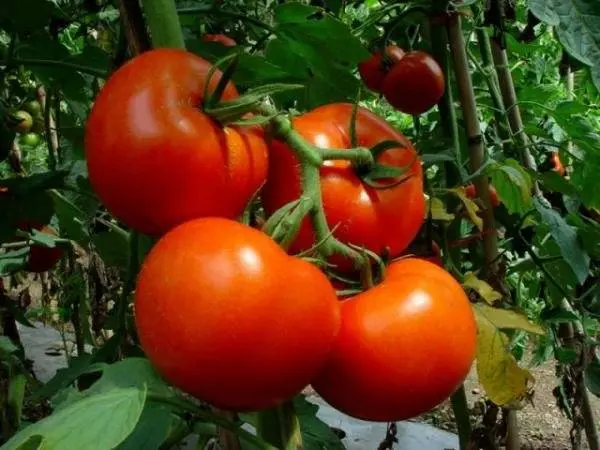
Undersized, no more than 50 cm in open ground, not a standard variety. The plant is determinant. Bred in the Kazakh SSR and loved by several generations of gardeners. It was registered in the State Register 50 years ago.
The variety is early. Until the first tomatoes ripen, depending on weather conditions, no more than a hundred days pass. The variety does not require garter and pinching.
Tomatoes are spherical, medium in size, weigh 100 g. Mature tomatoes are red, but the variety got its name because of the color of the fruit during ripening. Initially, the tomatoes are light green in color, as they ripen, they brighten more and more, starting to resemble the White Filling apple variety in color.
The original goal of breeding when breeding this variety was to process the crop into tomato products, but it turned out that this variety tastes quite good even when fresh. Nevertheless, it makes excellent ketchup, tomato paste and juice. Although the juice will be a bit thick.
The advantages of the variety, carried through time, are: unpretentiousness to weather and care, early maturity and friendly return of the crop, good taste, resistance to cracking on the bush and during conservation.
Disadvantages appeared after the breeding of new more productive varieties. Today, they can be considered an average yield (3 kg per bush) and an average resistance to diseases.
The variety is prone to late blight, which does not have time to reach it, as the crop ripens earlier. At the same time, it is immune to macrosporiosis.
Features of agricultural technology
Since “White filling” is a variety and you can get seeds from it, before planting, the seeds must be treated with disinfectants without fail.
The ideal place to grow the variety is Kazakhstan, but “White filling” also grows well in Ukraine and in the southern regions of Our Country.
Tomato “Korneevsky Red”
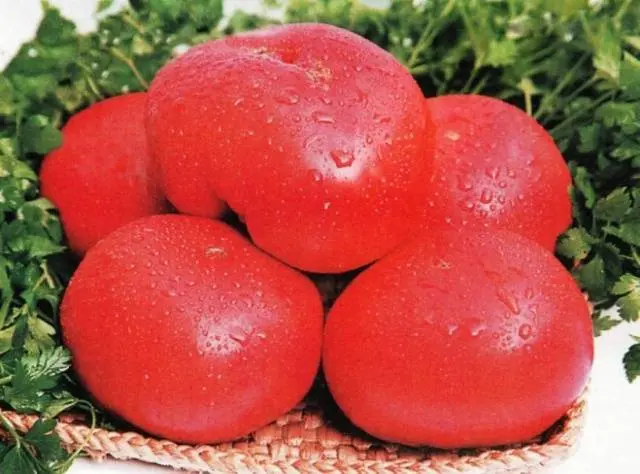
Early ripe indeterminate tomato. The bush is powerful, densely leafy, up to 1,5 m high. Up to 6 kg of tomatoes are removed from one bush. Tomatoes are tied in small brushes of 3-4 fruits each.
Large-fruited, so the bush requires mandatory tying to a solid support. The weight of tomatoes starts from 0,5 kg. Tomatoes on the lower branches can grow up to 1 kg.
The fruits are round, with a dense glossy skin. In a ripe state of saturated red color. The pulp is fleshy, moderately dense, sweetish in taste.
The purpose is universal. Recommended for both private household plots and farms.
Tomato “Fatima”
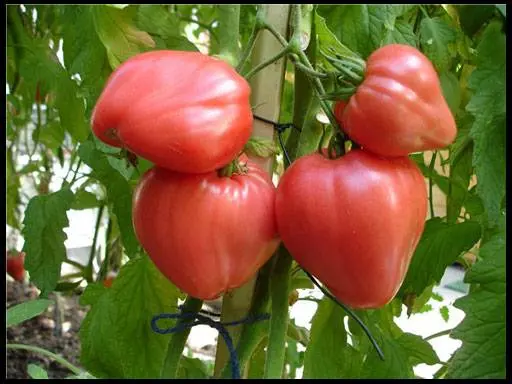
Large-fruited variety of determinant type. The height of the bushes is up to 60 cm. It is not a standard. Needs a garter, but does not require pinching. Can be grown in all regions of the Federation.
‘Fatima’ is an early variety with a vegetative period of 85 days, growing well outdoors. Fatima F1 is a mid-early hybrid for greenhouse conditions. Both varieties are resistant to diseases, not susceptible to late blight and show high yields.
“Fatima” is a pink heart-shaped tomatoes with an average weight of 350 g. The fleshy pulp has a pleasant sweetish taste. Tomatoes are resistant to cracking.
The purpose is universal.
A few tips that can help you get an early and rich harvest
Copper wire against late blight
The scourge of many garden crops is late blight, due to which the entire crop can be lost in the bud. As a preventive measure, piercing the lower part of the stem with copper wire is used. Copper is left in the stem.
Copper against phytophthora:
All foreign particles such as insulation residues, oxides, lubricating oil must be cleaned from it.
Copper particles will be picked up by juices and carried throughout the tomato bush, and fungi do not like copper.
It should be borne in mind that this is only one of the protection methods used in the complex. From rain and cold dew, tomato bushes should at least be covered, not counting on copper wire alone.
There is one more thing. Copper will accumulate in tomatoes. True, it is unlikely that it will be able to accumulate in quantities harmful to the body. Copper as a trace element is necessary for humans, and fertilizers containing copper increase plant productivity.
How to speed up the ripening of tomatoes
Accelerating the ripening of tomatoes on a bush instead of ripening green fruits is especially important for fairly cold regions, for example, the Urals. The basic principle underlying all these methods is to limit the supply of nutrients from the soil in order to force the plants to fight for survival and start “working for seeds.”
First of all, stop fertilizing the bushes and stop abundant watering. The lower leaves are cut off completely so that the nutrition goes to the fruits, and not to the foliage.
There are five mechanical methods to speed up the ripening of tomatoes, applied to tomatoes growing in unprotected ground.
- In undersized bushes, the branches are turned towards the sun and fixed with spacers. Spacers are placed under the brushes with fruits.
- The tops of the bushes are pinched, leaving only brushes with ovaries. Two leaves are left above the brushes to ensure fruit growth.
- Plants are sprayed with iodine solution based on 10 liters of water 35 drops of iodine for one and a half linear meters of beds.
- Low-growing and medium-sized determinant bushes can grow 4-5 brushes as much as possible, so all extra inflorescences are ruthlessly broken out.
- At the end of summer, when the tomatoes have already grown and entered the ripening stage, one of the following actions is carried out:
- holding the tomato bush by the lower part of the stem, pull it up a little several times. At the same time, the stem is twisted in a spiral;
- in the lower part of the stem at a distance of 100-120 mm from the ground, a slit 70-100 mm long is cut with a sharp knife. To prevent the gap from closing, it is necessary to place a chip with a diameter of 5 mm in it;
- 30-40 mm from the ground on the stem, tighten a thin copper wire, wrapping it around the stem several times.
Conclusion
Usually, early-ripening tomato varieties are not able to shake with their unique taste, but they can be used to make excellent homemade ketchup and mild adjika.
And of course, early tomatoes can be used in vitamin salads from fresh vegetables.










